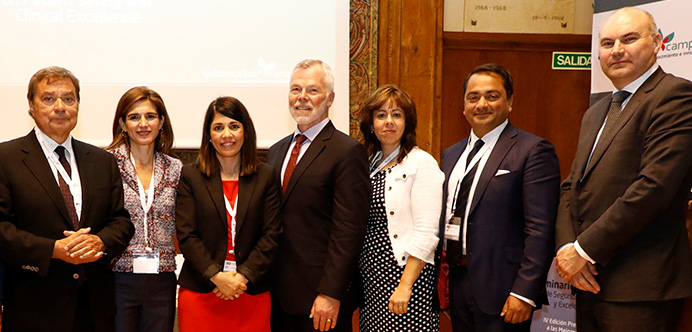
The Practicum Foundation has attended the V International Seminar on Patient Safety and Clinical Excellence, organized by Quirónsalud at the Jiménez Díaz Foundation in Madrid. The meeting has brought together about 350 professionals in an opportunity to learn what it is being done in other latitudes and learn from a handful of leaders. On our part, we took the opportunity to interview Patrick Courneya, executive vice president and chief medical officer of Kaiser Permanente.
Madrid - May 24, 2018. "In the culture of patient safety, the first thing is to recognize the errors and communicate them; we must be transparent," said Juan Antonio Álvaro de la Parra, manager of the Jiménez Díaz Foundation, at the opening of the V International Seminar on Patient Safety and Clinical Excellence, organized by the Quirónsalud Campus in the aforementioned hospital. At his side, Dr. Raimon Belenes, director of the event, urged the audience to learn without complex from the best. As a common front, Nuria Diaz and Dr. Nuria Marañón, quality corporate director and head of the patient safety department of the hospital group, respectively, have asserted that both clinical excellence and quality of care are unattainable without a safe environment.
Clinical management has undergone changes over time in the way it is addressed. The transition has gone from the volume-based model to the patient-centered model, passing through the value-based model. Patient-centered medicine places the focus on the growing value of the patient as the center of the health system. The bottom line is the perseverance in the implementation of quality programs and patient safety, as well as the measurement of results and experimentation on things that actually work. The interest of the health authorities, directors, and clinical managers lies both in the management of the incorporation of a disruptive medical innovation and in facing the challenges of a medical practice that still causes, when safety and quality fail, damage to patients, stress to professionals, and waste of resources.
In this fifth edition of the seminar, which has gathered approximately 350 professionals, the Jiménez Díaz Foundation has counted on the participation of three leaders who work in different organizations and contexts: a large insurance company like Aetna, present in two hundred countries and which proves that quality and safety is not only a matter of providers; Kaiser Permanente, a reference in the United States and beyond its borders for its approach to an increasingly dynamic medicine; and, finally, a health care system like the one in Scotland, with a well-established reputation of sobriety and robustness.
Shared experiences
Asked about the true guarantors of patient safety, Dr. Sneh Khemka, president of the international area of Aetna, said that "it is a joint work involving clinicians, regulatory authorities, governments, quality improvement organizations, and the hospitals themselves to join forces. It is a cycle of continuous improvement, but everyone must be on board, because quality has to be at the heart of any organization," he added. Incidentally, Khemka mentioned the utility of value-based contracts, based on results in health and cost, as an alternative to the traditional payment by the insurance companies for medical services.
Dr. Patrick Courneya, executive vice president of hospitals, quality, and healthcare excellence of Kaiser Permanente, also stressed the importance of involving all members and has pointed out the need to shorten durations of hospital stay, but above all, he emphasized the need to improve quality by avoiding never events and identifying good practices and extending them. In addition, Courneya has reported on some of the technological initiatives carried out by Kaiser Permanente, such as the mHealth and telehealth programs in the field of mental health, which provide information on the status of patients as well as their impressions of the medical professionals, providing a feedback that is "very important to us because it is the very basis of the work we are carrying out."
Finally, Dr. John Harden, National Clinical Lead for Quality and Safety of the Scottish Government, praised the Patient Safety Program undertaken in his country 10 years ago: "The key has been to support instead of penalizing, with tenacity and inclusive celebration of success being fundamental." Focused on the idea of establishing direct communication from the bottom up, Dr. Harden has expressed interest in the fact that "patients describe their experiences to us; we listen and encourage them to answer." Something that has paid off in campaigns, according to him, such as the one last year on sepsis to improve mortality figures, because "sometimes a small change can have a very important impact.”
Our personalized help center enables you to obtain technical support and help for navigating through the site and using the program.